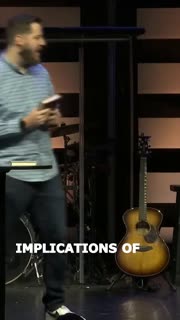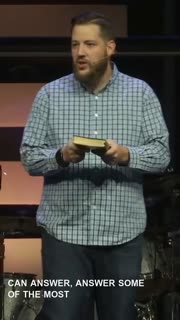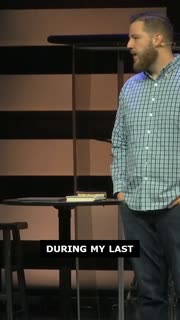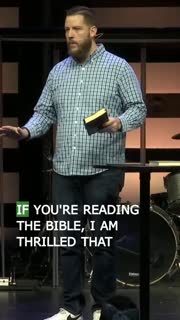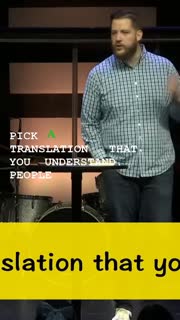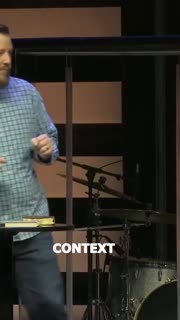Engaging with the Bible: Practical Tips for Rejoicing
Devotional
Sermon Summary
Bible Study Guide
Sermon Clips
1. "Think about the implications of that for a second. This isn't just a book, which it's not just a book anyway, right? Um, this is 66 books written in three different languages across 1500 years by 40 different authors. And it still tells one coherent story. That's incredible. But if this isn't just that, if this is the inspired word of God, then the implication is that the things in it are true. That it is, it is applicable to our lives. That this book can, can impact our lives daily." [24:54] (50 seconds)
2. "It can answer, answer some of the most difficult questions that we face, that it could speak to where we can find comfort, where we can find value, where we can find peace, how we can find hope. It can speak to our purpose. It can speak to our future. It, it can define so many things for us. I mean, the Bible speaks about the power of the word of God. And that's what we believe this is. The inspired word of God." [25:30] (33 seconds)
3. "And yet that same study that said that 70% of Americans believe that this is the inspired word of God, that same study saw that only 16% of Americans read it regularly. And that's not daily. It's just a few times a week regularly that they would open the word of God. Think about that gap. I mean, if this is the word of God, why would we not be reading it? Why would we not read the Bible?" [26:37] (37 seconds)
4. "During my last 12 years of ministry, I have talked a lot about the importance of reading the Bible. I have spoken to middle schoolers on it. I've spoken on it in here and I have talked to, it feels like every one from sixth graders through people that are well beyond sixth grade about why they struggle to read the Bible. And what's interesting is whether they are well beyond sixth grade or in sixth grade, the conversation goes about the same, right? I hear the same things back. Well, I tried. It was kind of boring, right? It was really confusing. I tried but I just didn't feel like I was getting anything out of it. I didn't know where to start." [28:34] (52 seconds)
5. "If you're reading the Bible, I am thrilled that you are reading the Bible. I'm trying to give some practical tips that will help people start to engage in God's word. All right. The other thing is I do have some practical tips that will help some resources that I'm going to reference through this. They are all available in the message notes today. So if you go to the cross point Cape app and open that bad boy up, uh, one of the, I think it's the second category. The second button is message notes. If you click on that, it has all the resources I'm going to reference, uh, linked in there. And so, uh, these are really, really helpful things." [35:36] (37 seconds)
6. "Pick a translation that you understand. People really struggle with the translations thing. How do we get them? Why are there more than one? How did this happen? So the Bible was originally written in three different languages. I told you, but, uh, it's biblical Greek, Hebrew, and Aramaic. I don't speak any of them. I don't know. Maybe you do, but I need the Bible in English. That's the one I speak. That's the one I understand." [37:05] (30 seconds)
7. "Context is key. Context is key. Context is key. This is part of the reason that the lucky dip method is not a very good method of reading scripture. Because when we hop into random places, we don't even know who he is in the sentence necessarily. Is he God? Is he Jesus? Is he David? Is he Paul? Is he King Herod? Who is he in this sentence, right? Context. It matters. It's a big deal. So I would really encourage you to read whole books of the Bible, all right?" [40:23] (45 seconds)
8. "Read the Bible in some larger chunks, to really dive into these letters and these stories in a way that makes sense and that lines up with how they were written to be engaged with, right? These authors assumed that when people would read their letters, they would read the Bible in some larger chunks. And so, I want to read their whole letter. That's just what would make sense." [50:03] (25 seconds)
9. "This is the inspired Word of God. And it is powerful. It is a powerful, powerful, powerful, powerful, powerful, powerful, and it is an incredible gift that any time that we want to, day or night, we can open the Bible and read the Word of God, guys. The Word of God. Truth for all time. Truth for all situations. Truth that applies to us thousands of years later. Truth that is beyond anything that we have access to. We have access to this. And it's never been easier. And so this week, read the Bible. It is a powerful, powerful tool for us." [54:44] (51 seconds)
Ask a question about this sermon
2. "It can answer, answer some of the most difficult questions that we face, that it could speak to where we can find comfort, where we can find value, where we can find peace, how we can find hope. It can speak to our purpose. It can speak to our future. It, it can define so many things for us. I mean, the Bible speaks about the power of the word of God. And that's what we believe this is. The inspired word of God." [25:30] (33 seconds)
3. "And yet that same study that said that 70% of Americans believe that this is the inspired word of God, that same study saw that only 16% of Americans read it regularly. And that's not daily. It's just a few times a week regularly that they would open the word of God. Think about that gap. I mean, if this is the word of God, why would we not be reading it? Why would we not read the Bible?" [26:37] (37 seconds)
4. "During my last 12 years of ministry, I have talked a lot about the importance of reading the Bible. I have spoken to middle schoolers on it. I've spoken on it in here and I have talked to, it feels like every one from sixth graders through people that are well beyond sixth grade about why they struggle to read the Bible. And what's interesting is whether they are well beyond sixth grade or in sixth grade, the conversation goes about the same, right? I hear the same things back. Well, I tried. It was kind of boring, right? It was really confusing. I tried but I just didn't feel like I was getting anything out of it. I didn't know where to start." [28:34] (52 seconds)
5. "If you're reading the Bible, I am thrilled that you are reading the Bible. I'm trying to give some practical tips that will help people start to engage in God's word. All right. The other thing is I do have some practical tips that will help some resources that I'm going to reference through this. They are all available in the message notes today. So if you go to the cross point Cape app and open that bad boy up, uh, one of the, I think it's the second category. The second button is message notes. If you click on that, it has all the resources I'm going to reference, uh, linked in there. And so, uh, these are really, really helpful things." [35:36] (37 seconds)
6. "Pick a translation that you understand. People really struggle with the translations thing. How do we get them? Why are there more than one? How did this happen? So the Bible was originally written in three different languages. I told you, but, uh, it's biblical Greek, Hebrew, and Aramaic. I don't speak any of them. I don't know. Maybe you do, but I need the Bible in English. That's the one I speak. That's the one I understand." [37:05] (30 seconds)
7. "Context is key. Context is key. Context is key. This is part of the reason that the lucky dip method is not a very good method of reading scripture. Because when we hop into random places, we don't even know who he is in the sentence necessarily. Is he God? Is he Jesus? Is he David? Is he Paul? Is he King Herod? Who is he in this sentence, right? Context. It matters. It's a big deal. So I would really encourage you to read whole books of the Bible, all right?" [40:23] (45 seconds)
8. "Read the Bible in some larger chunks, to really dive into these letters and these stories in a way that makes sense and that lines up with how they were written to be engaged with, right? These authors assumed that when people would read their letters, they would read the Bible in some larger chunks. And so, I want to read their whole letter. That's just what would make sense." [50:03] (25 seconds)
9. "This is the inspired Word of God. And it is powerful. It is a powerful, powerful, powerful, powerful, powerful, powerful, and it is an incredible gift that any time that we want to, day or night, we can open the Bible and read the Word of God, guys. The Word of God. Truth for all time. Truth for all situations. Truth that applies to us thousands of years later. Truth that is beyond anything that we have access to. We have access to this. And it's never been easier. And so this week, read the Bible. It is a powerful, powerful tool for us." [54:44] (51 seconds)
